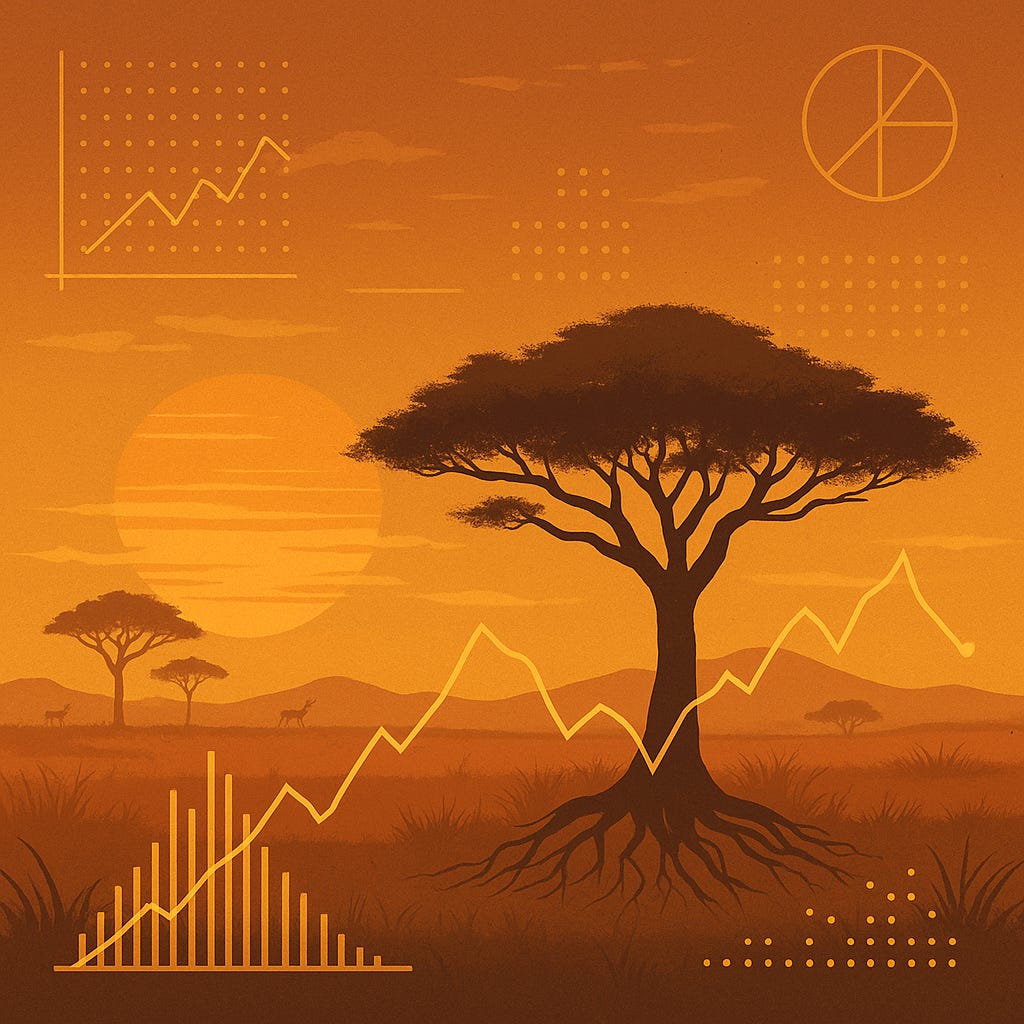When Data Meets Philosophy
How cultural resilience metrics and African systems thinking reframe the future of development.
“The Thinking Savannah” is more than a name, it’s a claim: that intelligence resides not only in books, machines, or data centres, but in rituals, communities, landscapes, and memory. The savannah is not silent. It listens. It remembers. It teaches.
Data is only as smart as the worldview it serves. In today’s development policy circles, the numbers reign: GDP per capita, Human Development Index, GINI coefficients. These figures work well in certain contexts, but they miss the soul of a society particularly ones where they tell you there is 70% unemployment, GDP is $450, yet families are fed daily and children in school. In these societies, a single conversation may make you reconsider your life choices, the depth, the wisdom, the resilience and the hope, things we lose as we polish the corporate ladder. Existing indices can measure income but not inheritance, inequality and identity.
That’s why I am experimenting with something I call Tradition Resilience Score (TRS) and Tradition Vulnerability Index (TVI), two metrics to quantify how well a society retains and adapts its traditional knowledge systems under modern pressure.
Tradition Vulnerability Index (TVI): A metric that measures the susceptibility of a nation’s traditional practices to erosion under modern pressures. A higher TVI indicates greater vulnerability.
Tradition Resilience Score (TRS): A composite index that reflects the balance between traditional cultural strength and the pressures imposed by modern socio-economic factors; essentially, it measures how well a society’s traditions withstand modernization.
Alongside this, I introduce the Acacia Framework, a visual language for African systems thinking rooted in ecological logic, oral memory, and decentralised governance. Together, they offer a radical way to think the savannah through numbers—not to dominate it, but to listen to it more precisely.
The abridged backstory
The first seed for these concepts was planted by the TV series Hustle, particularly the principle that “You cannot con an honest man,” and it was watered by interactions with fellow Africans from all walks of life. The one thing common about us is how trust is embedded in us, how warm and welcoming we are (in general), values that every business lists in one form or another. However, economically, the motherland has some of the weakest economies despite resource abundance and an ok moral campus. So then, in trying to figure out solutions to the African predicament, I’ve compiled all sorts of data, running analyses and comparisons that lead to TRS, TVI, TSI, and the Acacia Framework. At this point, I feel these provide a somewhat solid foundation for conversation and experimentation. And if you’re tracking with me, you’re probably thinking, “What does honesty have to do with it?”, let it simmer, you’ll catch on soon…
When Ritual Meets Regression
The TRS is built on four key variables:
Tradition Strength Index (TSI): Cultural continuity, religious practice, ritual persistence, and language retention (scored 0–10)
Median Age: The younger the population, the higher the transmission potential of traditional knowledge
Population (log scale): The scale at which traditions can circulate.
GDP per Capita: A proxy for modernity’s potential to dilute or disrupt cultural systems.
The preliminary findings are striking:
High-income nations like the U.S. and Ireland score low on TRS, despite economic performance. Their traditions are thinning.
Lower-income countries like Ethiopia or DR Congo rank high on TRS. Their cultures remain resilient, anchored by youthful populations and robust traditions.
There’s a negative correlation (–0.61) between median age and tradition strength, suggesting older populations may face more cultural drift.
Yet TRS correlates positively (+0.66) with societal well-being—tradition and development need not be opposites.
This is what I call the economic-cultural paradox: the more we “develop,” the more we risk forgetting how we developed in the first place. For brevity, I have left out the detail of the research and will be making it public in the next few weeks.
In comes The Acacia Framework, systems thinking from the soil up. To interpret these numbers, we need more than graphs—we need metaphors. That’s where the Acacia Framework comes in. The Acacia tree is more than a botanical species. It is:
Roots: ancestral memory, oral tradition, ritual knowledge
Trunk: decentralised, consensus-driven governance
Canopy: storytelling, social learning, innovation through dialogue
Ecology: adaptive logic grounded in seasonality, environment, and community
African societies did not need central bureaucracies to thrive. Their knowledge systems were distributed, resilient, and context-aware—qualities we now admire in modern networks and AI models.
The savannah, in this light, is not empty space—it is an epistemic engine. And African traditions are not static relics; they are living codes of adaptability and design.
Why This Matters for Policy, Development, and the Planet
I’m not just playing with numbers here, though honestly this came out of one of my boredom moments. It’s not an easy task, the most complicated bit here is getting data. That’s a huge struggle especially now that I know what I want to achieve, I know some of the data does not exist and has to be simulated within reason. Other data points have to be collected. Difficult as it may be, this work offers:
New metrics for global bodies like UNESCO, UNDP, and the African Union to assess cultural risk and resilience.
Curriculum and media design strategies that centre tradition as strength, not stigma
Social cohesion tools to heal divided nations through intergenerational storytelling and ritual memory.
Sustainability models that treat culture as part of climate resilience—not just an afterthought
Most importantly for me, doing this is fun, it’s making sense of the world by building a bridge between quantitative analytics and cultural wisdom, where neither eclipse the other. And that is the goal of The Thinking Savannah. To affirm that the savannah is not a backdrop to development. It is a protagonist. It is a teacher. And now, with the right tools, it is also a data scientist.


